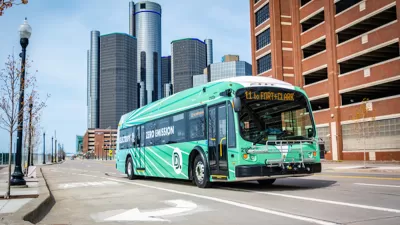A suburban Detroit developer is promoting an alternative vision for Detroit's Belle Isle: transforming the island park into a commonwealth free market utopia for the elite.
Like the city it belongs to, Detroit's 982-acre Belle Isle, designed as an urban park in the 1880's by Frederick Law Olmsted, has seen better days. The island, which sits in the middle of the Detroit River, has suffered from disinvestment along with the rest of the City; its partially stocked aquarium is open one day per week after a five-year closure, and other amenities, like the zoo and canoe livery, have been closed for years.
Still, Belle Isle looms large in the hearts of Detroiters, and a proposal to turn over management of the island to the Michigan Department of Natural Resources has met with resistance from some residents and City Council.
Given reluctance to lease the island to the State of Michigan, it seems highly unlikely a new proposal from Bingham Farms developer Rodney Lockwood- to buy the island from the cash-strapped city for $1 billion dollars to have it secede from Michigan and become a semi-independent commonwealth like Puerto Rico- would gain any traction. According to Lockwood's plan, approximately 35,000 citizenships would be available for $300,000 each. A reduced fee or sponsorship for 20% citizens would be reserved for entrepreneurs, immigrants and artists who cannot meet the financial requirement.
Due to a rapidly deteriorating financial situation, Detroit may soon be placed under the control of an Emergency Financial Manager. Under the previous Emergency Manager law, which voters rejected in November, an EFM had unilateral power to sell city assets. It is unclear if a new EFM would have such powers under the replacement law, passed by the Michigan Legislature's lame duck session last month.
FULL STORY: Developer pitches $1B commonwealth for Belle Isle

Alabama: Trump Terminates Settlements for Black Communities Harmed By Raw Sewage
Trump deemed the landmark civil rights agreement “illegal DEI and environmental justice policy.”

Study: Maui’s Plan to Convert Vacation Rentals to Long-Term Housing Could Cause Nearly $1 Billion Economic Loss
The plan would reduce visitor accommodation by 25% resulting in 1,900 jobs lost.

Planetizen Federal Action Tracker
A weekly monitor of how Trump’s orders and actions are impacting planners and planning in America.

Waymo Gets Permission to Map SF’s Market Street
If allowed to operate on the traffic-restricted street, Waymo’s autonomous taxis would have a leg up over ride-hailing competitors — and counter the city’s efforts to grow bike and pedestrian on the thoroughfare.

Parklet Symposium Highlights the Success of Shared Spaces
Parklets got a boost during the Covid-19 pandemic, when the concept was translated to outdoor dining programs that offered restaurants a lifeline during the shutdown.

Federal Homelessness Agency Places Entire Staff on Leave
The U.S. Interagency Council on Homelessness is the only federal agency dedicated to preventing and ending homelessness.
Urban Design for Planners 1: Software Tools
This six-course series explores essential urban design concepts using open source software and equips planners with the tools they need to participate fully in the urban design process.
Planning for Universal Design
Learn the tools for implementing Universal Design in planning regulations.
Caltrans
Smith Gee Studio
Institute for Housing and Urban Development Studies (IHS)
City of Grandview
Harvard GSD Executive Education
Toledo-Lucas County Plan Commissions
Salt Lake City
NYU Wagner Graduate School of Public Service




























